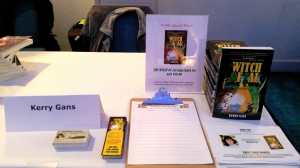I am a writer. Sounds simple, doesn’t it? I am one thing—a writer—and I do one thing—write.
But it’s so much more complicated than that.
The Craft Side
When we write, we morph between many different mindsets. Writing comprises so many levels of detail, we are constantly changing roles. We are:
Idea Generators:
A story starts with an idea. Perhaps it’s a question we ask ourselves—a “why” or “what if.” Perhaps an event sparks intriguing ideas for fictional backstory of the people involved. Perhaps an unusual bit of architecture or an out-of-context snippet of conversation causes us to wonder what the story behind that is. Perhaps two random bits of information collide in our brain and make us say, “Hmm.”
Researchers:
Almost every book needs research—some genres more in-depth research than others. A historical or science-based book will need more detailed research to make the story ring true. A modern-day suburbia story may need some research, but we are more familiar with that setting so less is needed. Writing an occupation we are not familiar with needs research. Science fiction and fantasy world-building may require research into certain techniques or time periods, and the world-building itself is a type of research—investigating the world you imagined to ensure it makes sense in itself. Any flaw in the logic of a story-world, or any mistake in the details of reality-based writing can throw a reader out of the story.
Our story needs structure—and like any building, without a solid structure it will fail. There are many different story structures available to us, and our job is to find the one that will best support our story and show it to its best advantage. One we have the structure, we can add the flourishes that make the story uniquely our own.
Psychologists:
Our stories have characters. Therefore, we must be psychologists, delving into the human condition and showing it on the page. If we fail to build believable, relatable characters, our story will fall flat and our readers will not be enthralled.
Editors:
After days, weeks, months of being immersed in our story world, we have to handle a gigantic switch in gears. We need to become editors. We need to disengage enough to see if we have been successful in our architecture and psychology, and even if our initial idea really stands the test of the telling. Also wrapped into editor is the grammarian, who worries about the details of punctuation and typos and word choice.
The Business Side
Authors are also business people. Depending on if we self-publish or go traditional, we are:
Formatters:
Whether ebook or paper, our book needs to be formatted properly to give the reader the best possible experience. Dealing with ebooks can also mean inserting links and other bells and whistles, while with paper books we must consider everything from font to kerning to margins to chapter headings.
Cover Artists:
Every book has a cover—and that cover is vital to the success of our book. It must draw the reader in, speak to the heart of the book, and be visually appealing both in thumbnail and in full size. Certain genres will have certain conventions, and you must know what those are in order to connect with the proper audience. Cover art is where theme, art, design, and marketing collide.
We live in an intensely visual society, and almost everything we do has a visual or graphic component. Some of us do our own websites. Most of us design our own business cards, bookmarks, postcards, and flyers we need for events. Even something as simple as adding photos to a blog post is a design project.
Publishers:
If we go the self-published route, then we are also publishers, needing to take all the steps above and most of the ones below. We often need to legally set up a business and take care of all the necessary paperwork that comes along with that. If we choose to have print boks, we need to deal with things like paper stock, print runs vs. POD, distribution, and sales.
Retailers:
We have to sell our books, especially if we are self-published or POD and big bookstores won’t take us. We need to make it as easy as possible for people to buy our product. This means a lot of hand-selling, marketing to groups, dealing with independent bookstores, and mybe even setting up your own online store for you products.
Marketers:
We need to market so people will know how to find our product. This is a skill set we will need no matter how we publish—self-published, small press, or traditional. The author is the brand, not the book. So we, as the author, need to learn to market ourselves and our products to our audience. This will involve everything from social media to live presentations.
Book signings, conferences, conventions, library events, book fairs, school visits… Although many of us are introverts, there is no getting around the fact that we are also public figures. People want to hear from us, and live presentations are often a part of our marketing lives. Depending on the venue, we may need to have PowerPoint presentations, skits, videos, or other props as well as just a spoken presentation.
Distributors:
If we’re self-published, we need to distribute the books. Not so difficult with ebooks, but distribution can be a hassle with print, because print requires shipping fees and—if you decide to accept returns—storage of books returned.
Accountants:
Then there’s the money. How much is coming in? How much is going out? What is tax deductible? Have we paid the sales tax we owe the state? We need to follow up with customers that owe us money, and pay our own bills on time. At the end of the day, if all your accounts balance and you’re in the black, it’s cause for celebration!
How to Have It All
Whew! That’s a lot of roles to play for one person. Is it any wonder that so many authors get overwhelmed?
Yet authors manage to juggle all this all the time. Many times authors are also managing non-writing-life roles such as day jobs and family and friends. It can be done.
The answer to how to have it all is simple: outsourcing and organization.
Outsourcing:
Certain things beyond our skill set should be outsourced. If our financial situation allows it, then this option is easy. Finding ways to outsource when you don’t have money to spend is more challenging, but it can be done.
Outsourcing the things we dislike the most can also help because it relieves our stress. Those things that we drag our feet on because we hate them so much may not be the ones that are the most complex or time consuming, but by taking those migraine-inducers off our plate, we can focus on the things we enjoy—and we all know that doing something we enjoy doesn’t feel as much like work!
Organization:
Those authors who have it all are also highly organized. They have schedules and they stick to them. They have daily goals, weekly goals, monthly goals. They find a way to stay focused on the tasks at hand. That’s the only way they can address all the details of being an author without dropping anything through the cracks.
Your organization scheme may not look like mine. I tend toward spread sheets and color-coding. Other people use hand-written daily planners. Others use calendars. Still others use computer reminders or hang large dry-erase boards on the walls. The point is, there is not one way to be organized—there is only the way that works best for your brain and your life.
If that means you have to stick a post-it note on the coffeemaker each night so you remember what your goals are the next morning, so be it.
What other roles did I miss? Do you have any other tips for juggling all the roles wrapped up in that deceptively simple word, “writer”?





[…] you read my post about all the hats we writers wear, you can see how overwhelming our tasks can be, and also see why so many authors get burnt out. […]
LikeLike
By: Break It Down to Avoid a Breakdown - Kerry Gans, Author on March 10, 2016
at 9:01 am
[…] Successful Writer’s Many Roles : How to Have It All […]
LikeLike
By: The Best of the Author Chronicles 2016 | The Author Chronicles on January 5, 2017
at 1:02 pm